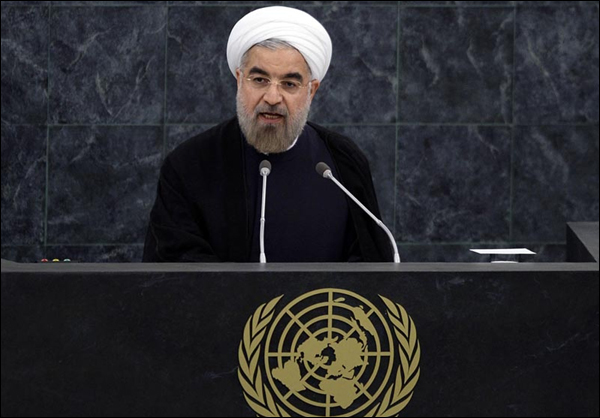The president made the remark in his speech to the 70th Session of the UN General Assembly in New York on Monday.
He said the feelings of millions of Muslims being hurt by the incident amounts to spiritual loss which cannot be compensated for simply by material means.
“The public opinion demands that Saudi authorities discharge, without delay, their international responsibility in providing immediate consular access for the quick identification and returning of the bodies [of the diseased],” said the president.
“It is also required that the necessary conditions be provided for [conducting] an independent and precise inquiry into the causes of the [Mina] disaster and [working out] methods for preventing a repeat of that in the future,” President Rouhani added.
The number of Iranian pilgrims killed in the recent tragedy in Saudi Arabia’s Mina has increased to 226 with around 250 more still unaccounted for.
The Saudi Health Ministry says around 770 people lost their lives in the crush in Mina, near the holy city of Mecca, on September 24. However, Iran’s Hajj and Pilgrimage Organization puts the total number of pilgrims killed in the incident at more than 2,000.
JCPOA
The president then touched upon the agreement clinched between Iran and six world powers over Tehran’s nuclear program in the Austrian capital of Vienna on July 14, saying the agreement known as the Joint Comprehensive Plan of Action (JCPOA) was the manifestation of the “national will” of Iranian people.
Immediately after the JCPOA was signed, said President Rouhani, it was approved by the UN Security Council as an international document.
On July 20, the Security Council unanimously endorsed a draft resolution (Resolution 2231) turning the JCPOA into international law. All 15 members of the body voted for the draft resolution in New York, setting the stage for the lifting of the UN sanctions against Iran.
He also said the agreement has laid the groundwork for broader relations between Iran and other countries.
“Today, a new chapter has been opened in Iran’s relations with the world.”
He noted that the JCPOA has helped ward off the specter of another war and lingering tension in the Middle East region, and “can and should usher in a new era and … [help achieve] lasting peace and stability in the region.”
Iran not after nukes
President Rouhani described UN Resolution 2231 as a catalyst for the removal of sanctions against Iran while recalling the unfair performance of the world body in the past.
“[UN] Security Council Resolution 2231, despite some shortcomings, was a key and fundamental change for the annulment of resolutions on sanctions against Iran.”
Nevertheless, the president highlighted, “We regard the UNSC’s performance in the past as unfair, and stress that Iran, due to the important fatwa by Leader [of the Islamic Revolution Ayatollah Seyyed Ali Khamenei] and also the country’s defense doctrine, has never intended to produce nuclear weapons, and hence, the [UN] sanctions resolutions against Iran were unfair and illegal.”
Scourge of terrorism
The Iranian president expressed misgivings over acts of terror, saying the key threat to the world today is “[lest] terrorist organizations turn into terrorist states.”
“We propose that war on terror turn into a document and an international binding rule, and that no government have the right to support terrorism as a method to interfere in nations’ affairs,” Iran’s chief executive underscored.
He said Iran stands ready to cooperate in fighting terrorism and setting the stage for bringing about “democratic developments” in the region.
President Rouhani recalled the World Against Violence and Extremism (WAVE) initiative he proposed during his 2013 speech at the UN General Assembly, saying it is possible to draw on the “JCPOA experience” coupled with the support by WAVE advocates to draw up a plan to solve problems gripping the Middle East, “which has been crushed by the clutches of ruthlessness and brutality.”
Military intervention root cause of terror
The Iranian president underlined that military interference is the root cause of war, devastation and terrorism.
“If the US had not launched military aggression against Afghanistan and Iraq, and if the US did not lend unflinching support for the [Israeli] Zionist regime’s inhumane acts against the oppressed Palestinian nation, today terrorists would have no excuse to justify their crimes,” he noted.
“It is necessary that the US government, rather than distorting the realities in the region and leveling baseless accusations against others, put an end to its own policies as well as the ones adopted by its regional allies,” saying the policies “stoke extremism, violence and sectarianism in the region.”
He urged Washington to align itself with the ideals and demands of the regional nations.
/149

